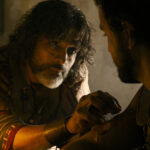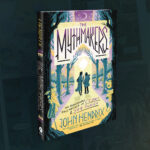The first image we see and the first sound we hear in Mudbound is, appropriately, the digging of dirt. More precisely: the digging of a grave. Two men with shovels dig a hole for their father, Pappy, a racist old white man. As they dig, they discover a skull and chains. This was also the final resting place of a slave.
Pappy would have preferred not to have been buried there, with the bones of slaves, but he’s buried there nonetheless. As the dirt covers his coffin, Pappy’s body begins a peaceful coexistence in death that it refused in life. His bones will soon be just like the slave’s—the same color, the same deterioration; his mortality no less mortal.
This scene—which bookends Mudbound (available now on Netflix)—sets the tone for the rest of the film and frames its commentary on life, race, and the things that unite and divide us. In its emphasis on mortality and materiality—mud, rain, bodies, bones—this opening scene ponders: In the end, aren’t the differences between people small compared to the vast terrain of humanity we share? Why do we tend to emphasize the former over the latter?
Dirt and Land
Based on the 2008 Hillary Jordan novel of the same name, Mudbound follows two families—one white and one black—whose fates are intertwined on a farm in post-World War II Mississippi. Henry McCallan (Jason Clarke) and his wife, Laura (Carey Mulligan), own the land and live on the farm with their two daughters and the curmudgeonly (and quite racist) patriarch Pappy (Jonathan Banks of Breaking Bad). The Jackson family, led by Hap (Rob Morgan) and Florence (Mary J. Blige), are tenant farmers on the land—the same land their ancestors once worked as slaves.
“What good is a deed?” Hap ponders in voiceover, early in the film. His ancestors “worked this land all their lives—this land that would never be theirs.” Hap’s family works hard and saves all the money they can, in hopes of one day having a few acres they can call their own. Until then, the dirt in which they toil remains dirt. It’s only land to those who own it, Henry says in his own voiceover. Or is it?
The economic inequality between the owners (the McCallans) and the tenants (the Jacksons) is explored in perceptive ways in the film, expertly directed by Dees Rees. But the two families are both tied to the land. Both work it. Their children both play on it. When sickness, death, and injury come, neither is immune from its effects. They may experience painful inequalities in life, but when they die, they are both bound for the same mud.
Rain Falls on Everyone
Last summer I saw a headline in the Los Angeles Times that said, “We may live in a post-truth era, but nature does not.” In other words: We can take our opinions, prejudices, and preferred “facts” to battle over everything from politics to sports to the president’s tweets. But weather is weather, regardless of our preferences or subjective spin. It’s either raining or it isn’t. And the rain falls on everyone.
Weather is weather, regardless of our preferences or subjective spin. It’s either raining or it isn’t. And the rain falls on everyone.
The weather plays a role in Mudbound (“I wish we could control the rain,” one character states), but it’s part of a larger point—so obvious and yet so subversive in today’s digital, disembodied world—that humans are embodied creatures in tangible, physical space. We share the same planet, drink the same water, breathe the same oxygen. Our bones are equally breakable, our blood the same color red. Every human body is susceptible to whooping cough and frail in the face of bullets and explosions.
Though their differences and inequalities are real, the McCallans and Jacksons live under the same sun. Both families love their children and—in the film’s more tender moments—love each other’s children too. The two mothers in the film, Florence and Laura, have both suffered miscarriages. All the same things drive them: love, pride, ambition, fear, survival, defense.
Indeed, when World War II breaks out near the beginning of the film, the leveling effect of national defense touches both families. Henry McCallan’s brother Jamie (Garrett Hedlund) goes off to Europe to fight, as does the Jacksons’ son Ronsel (Jason Mitchell). When the two return to Mississippi after the war, they bond over their shared experience and forge a cross-racial friendship that surprises both families and sets up the film’s dramatic climax.
Gaining Perspective
A few weeks ago I was in the desert, looking up at a sky that was as star-filled as I’d ever seen. The Milky Way was clear and magnificent, a bedazzled belt across the great expanse. In a telescope I saw other galaxies, farther afield. To look at such things is to be reminded that the universe is a big, big place. Earth is but a speck; each of us mere dust.
But too often we live with our gaze pointed downward, into ourselves and our own little worlds. Early in the film, Laura McCallan admits: “My world was small.” In this posture the little things become big; the slight variances among people become cause for alarm, reasons to fear. But these begin to dissipate when we gain a little perspective.
Too often we live with our gaze pointed downward, into ourselves and our own little worlds. . . . In this posture the little things become big; the slight variances among people become cause for alarm, reasons to fear.
This is a key theme of Mudbound. Perspective. Central to the story is the changed perspective Jamie and Ronsel experience by going to war in Europe, fighting a common enemy, getting to know different nations and cultures. They come back with a new clarity about the evil and illogic of racism. On the front lines they were more or less equal. Why can’t they walk through the same doors back home?
Separate Voices, Shared Hope
One of the ways Mudbound emphasizes perspective is by telling its story through multiple points of view. The film has stylistic echoes of Terrence Malick not only in the prominence of “golden hour” photography and handheld camerawork, but also in its frequent use of voiceover. Throughout the film we hear lyrical fragments of inner thought, via voiceover, from all the major characters (except Pappy: as the film’s outright villain, his inner world is never invoked). By putting the viewer into the shoes (and minds) of all these characters, Rees humanizes everyone. We hear their hopes, their memories, the words they dare not utter aloud. And we’re reminded again of the humanity they share.
Part of that humanity is mortality, and part of it is sin. There is a lot of sin to go around in Mudbound, a film whose agrarian setting feels like a sort of Paradise Lost. Both the McCallans and Jacksons long for renewal, for peace, for shalom on their farm. Yet there is constant death, bloodshed, injustice there. The songs both families sing reflect their similar eschatological longings. For the McCallans, it’s “Sweet hour of prayer, sweet hour of prayer! That calls me from a world of care . . .” For the Jacksons and the members of their makeshift church, it’s “One mornin’ soon, I heard the angels singing, all around my head . . .”
Both are cries for escaping present pain, longings for future glory. But in the meantime, the two families are equally in need of salvation, sin-stained and mud-bound as they are. To heal from the sin within and without, they need God’s intervention. They need resurrection. New life after war, after slavery, after lynch mobs, after murder. They’re all bound for the same mud in this life; but by grace they can all be glory-bound too.
Involved in Women’s Ministry? Add This to Your Discipleship Tool Kit.
 We need one another. Yet we don’t always know how to develop deep relationships to help us grow in the Christian life. Younger believers benefit from the guidance and wisdom of more mature saints as their faith deepens. But too often, potential mentors lack clarity and training on how to engage in discipling those they can influence.
We need one another. Yet we don’t always know how to develop deep relationships to help us grow in the Christian life. Younger believers benefit from the guidance and wisdom of more mature saints as their faith deepens. But too often, potential mentors lack clarity and training on how to engage in discipling those they can influence.
Whether you’re longing to find a spiritual mentor or hoping to serve as a guide for someone else, we have a FREE resource to encourage and equip you. In Growing Together: Taking Mentoring Beyond Small Talk and Prayer Requests, Melissa Kruger, TGC’s vice president of discipleship programming, offers encouraging lessons to guide conversations that promote spiritual growth in both the mentee and mentor.

































